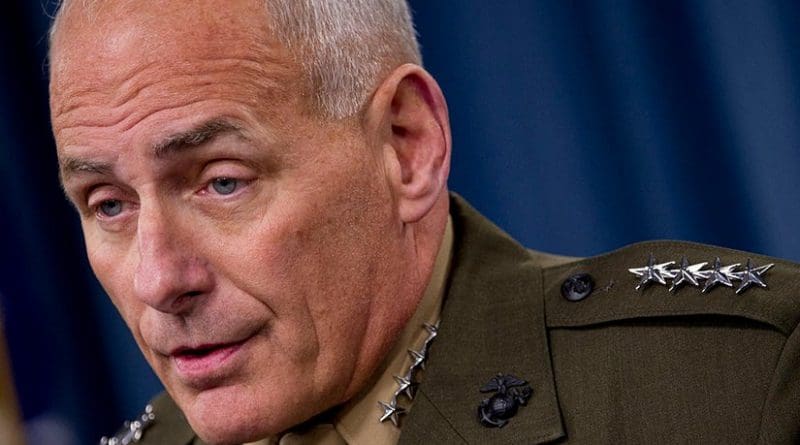Donald Trump’s Generals: John Kelly And Narco-Terror Nexus – Analysis
By Observer Research Foundation
By Abhijnan Rej
The third general to be nominated to a key national security position is Marine Corps General John Kelly. Kelly served as the commander of the US Southern Command (USSOUTHCOM) — an area of responsibility that covered Mexico, South and Central America, and the Caribbean — between 2012 and 2016. President-elect Donald Trump is expected to nominate him to lead the Department of Homeland Security (DHS) — the third largest cabinet department within the United States government.
One of the key focus areas of USSOUTHCOM has been surveillance and disruption of illicit narcotics and human trafficking networks and, as such, it enjoys a synergy of interest with domestic security concerns — DHS’s purview. Trump’s choice of Kelly — a much more low-key figure than Michael Flynn and James Mattis — seems to be natural. Kelly has long maintained a crime-terror nexus spanning West Asia, Africa and South America emerging as the next big threat to American national security. As head of DHS, thwarting this nexus will be his key priority.
The Department of Homeland Security itself is a creation of the 11 September, 2001 attacks. The attacks showed a deep disconnect between the intelligence agencies of the United States, law enforcement, and the immigration services. For example, soon after the attacks it became clear that two of the 9/11 hijackers were granted entry to the US despite being already noted as Al-Qaeda operatives by the CIA. Created in 2002, DHS is chartered to act as a single-point department dedicated to the prevention of terrorist attacks inside the US. However, the DHS has since faced criticism about its byzantine structure and its alleged role in privacy violation.
With the election of Trump, DHS will come into renewed focus as the parent cabinet department in charge of the citizenship and immigration, as well as customs and border protection services. One of the most divisive elements of Trump’s campaign was his harsh line towards immigration in general, and from Mexico as well as Muslim-majority parts of the world in particular. Trump’s rhetoric about building a “wall” between Mexico and the US will most likely remain just that — rhetoric. But Kelly’s DHS will have much greater latitude in enforcing a tougher line on immigration on national-security grounds.
In a 2014 interview to a US military journal, Kelly noted that the greatest threat to the United States emanating in the western hemisphere is “(…) the threat to the US coming through illicit networks” that link narco-traffickers to international terrorists. Noting that most instances where the US government has knowledge of links between the two remain classified, Kelly said, “We know that there are international terrorist organisations making vast amounts of money laundering drug proceeds that come out of the United States.”
In a statement before the Senate Armed Services Committee in 2014, Kelly specifically named the Iran-backed and Lebanon-based terrorist organization Hezbollah as exploiting “Venezuela, and the Argentina, Brazil, and Paraguay Tri-Border to engage in money laundering and other illegal endeavours, as well as recruitment and radicalisation efforts”.
A particular story stand out which justifies Kelly’s concerns about active terror-trafficking networks in action – straight of a Hollywood movie in its sheer audacity as well as apparent improbability. On 11 October 2011, the US government announced that it had evidence to prosecute two Iranian nationals, including one suspected Iranian Revolutionary Guard operative, for an attempt to assassinate the-then Saudi ambassador to the US, Adel al-Juber in a Washington D.C. restaurant. This in itself was exceptional in that the Iranians were bold enough to plot something like this on US soil.
This was just the tip of the iceberg. The Iranians had in fact tried to get a Mexico-based narco-trafficker to carry out the assassination – as well as bomb the Saudi and Israeli embassies, the US government alleged. (Not all were convinced that this was indeed a legitimate plan enjoying the approval of the Iranian government. Part of the scepticism stemmed from the fact that the Mexican narco-trafficker in question was, in fact, an undercover US Drug Enforcement Administration agent.)
But the terror-crime nexus about which Kelly has so apprehensively spoken on a number of occasions remains a reality in other instances. For example, Dawood Ibrahim’s nephew, Sohail Kaskar, was arrested in the US in December 2015 on charges of narcotics trafficking as well as intending to supply missile launchers to FARC — a Columbia-based terrorist organisation. The American journalist Gretchen Peters has extensively documented the deep links between Islamist terrorism and narcotics trade and trafficking in her 2010 book Seeds of Terror.
Kelly, in his statement before the Senate Armed Services Committee, expressed his deep concern that many smuggling pipelines “lead directly into the United States, representing a potential vulnerability that could be exploited by terrorist groups seeking to do us harm.” A persistent fear here is that terrorists would use smuggling routes to sneak a weapon of mass destruction — perhaps nuclear — into the continental United States.
Kelly, as the Secretary of Homeland Security, is better placed than many — through his experience in USSOUTHCOM — to assess the threats from the narco-terror nexus. The over-bureaucratised DHS has often been accused of falling behind the curve when it comes to assessing emerging threats. Kelly’s DHS will most likely be more proactive — provided Washington politics and inter-departmental squabbles don’t exhaust the general’s energy.
This article originally appeared in Firstpost.

